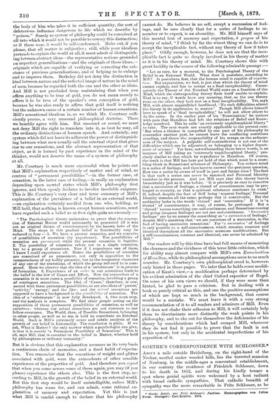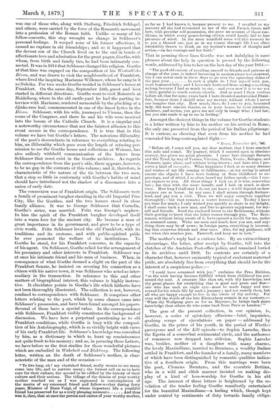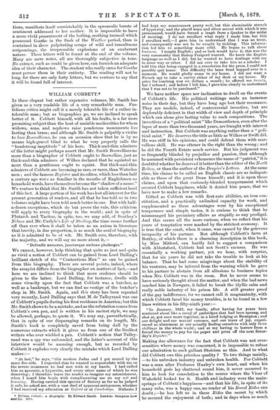GOETHE'S CORRESPONDENCE W1111 SCHLOSSER.*
ABOUT a mile outside Heidelberg, on the right-hand of the Neckar, nestled under wooded hills, lies the turreted mansion of Neuburg, in the middle-ages a conventual establishment, in our century the residence of Friedrich Schlosser, down to his death in 1852, and during his kindly tenure a spot where genial spirits were welcomed by a host radiant with broad catholic sympathies. That catholic breadth of sympathy was the more remarkable in Fritz Schlosser, as he * Goethe Brieje, ass Fritz Schlosser's Nodstau. Hersuogegebon von Julius Frew. Stuttgart Carl Srabbe. 1878.
was One of those who, along with Stolberg, Friedrich Schlegel, and others, were carried by the force of the Romantic movement into a profession of the Roman faith. Unlike so many of his fellow-converts, this step wrought no change in Schlosser's personal feelings. It warped none of his former affections, it caused no rupture in old friendships ; and so it happened that the devout son of the Church lived on to the end in bonds of affectionate love and admiration for the great pagan, Goethe, with whom, from birth and family ties, he had been intimately con- nected. It was in 1814 that Schlosser changed his religion. Goethe at that time was engaged on the composition of his Westostliche Divan, and was drawn to visit the neighbourhood of Frankfort, where lived the inspiring Marianne Willemer, whom he sang in it asiSuleika. For two weeks Goethe resided in Schlosser's house at Frankfort. On the same day, September 24th, guest and host started in different directions. Goethe went to visit Boisseree at Heidelberg, where in the old castle-yard he had the parting in- terview with Marianne, rendered memorable by the plucking of a djinko-tree leaf, commemorated in one of the finest lyrics in the Divan. Schlosser, with his wife, journeyed to Vienna, then the scene of the Congress, and there he and his wife were received into the bosom of the Catholic Church. It is a singular and a noteworthy circumstance that not the faintest allusion to this event occurs in the correspondence. It is true that in this volume we have but Goethe's letters. The notorious illiberality of the poet's descendants in reference to everything relating to him, an illiberality which goes even the length of refusing per- mission to see the Goethe house and collections at Weimar, has also sullenly withheld communication of the letters from Schlosser that must exist in the Goethe archives. As regards the correspondence from the poet's side, there appears, however, to be no gap in the contents of this volume; and it, therefore, is characteristic of the nature of the tie between the two men, that a step so little in conformity with Goethe's habits of mind should have introduced not the shadow of a dissonance into a union of early date.
The connection was of Frankfort origin. The Schlossers were a family of prominent burgher standing in the old Imperial Free City, like the Groethes, and the two houses stood in close
family alliance. It was to George Schlosser that Cornelia, Goethe's sister, MILS married. Fritz was George's nephew. In him the spirit of the Frankfort burgher developed itself
into a warm love for the ancient city. He became a man of great importance in its government, and grew to be a type of civic worth. Fritz Schlosser loved the old Frankfort, with its traditions and its customs, and with public-spirited pride he ever promoted the welfare of its institutions. To Goethe he stood, for his Frankfort concerns, in the capacity of his agent. On Schlosser, Goethe relied for the arrangement of his pecuniary and other interests in Frankfort. Schlosser was at once his intimate friend and his man of business. When, in consequence of what Goethe deemed a slight on the part of the Frankfort Senate, he insisted on severing his connection as a citizen with his native town, it was Schlosser who acted as inter- mediary in the transaction. In reference to this and other matters of biographical interest, this volume is highly instruc- tive. It elucidates points in Goethe's life which hitherto have not been thoroughly illustrated. The collection is not, however, confined to correspondence with Schlosser. It comprises other letters relating to the poet, which by some chance came into Schlosser's possession, and have been found amongst his papers. Several of these have a special value. In the correspondence with Schlosser, Frankfort visibly constitutes the background of discussion. We have here a perpetual questioning as to old Frankfort conditions, while Goethe is busy with the composi- tion of his Autobiography, which is so vividly bright with views of his early Frankfort life. Schlosser's knowledge was consulted by him, as a dictionary in which to hunt up reminiscences not quite fresh to his memory; and so, in perusing these Letters, we have before us the first studies for those wonderful pictures which are embodied in Wahrheit mut Dichtung. The following letter, written on the death of Schlosser's mother, is char- acteristic of the man and of the occasion :—
"To live long, oh ! my cherished friend, really means to see many come into life, and to survive many ; the former call on us to have care for their culture, the second to be edified by the history of their culture and their actions. The tidings of the demise of your worthy mother reached me as I was engrossed in contemplation of the merits of my esteemed friend and fellow-worker during forty years, Minister of State Voigt, of whose important life a youthful
friend has preserved for us a truly pleasing memento And thus was it, then, that at once the person and career of your worthy mother, as far as I had known it, became present to me. I recalled to my memory all she had recounted to me of the sad French times, and bow, with peculiar self-possession, she gave an account of those con- ditions, in which every peace-loving citizen could hardly fail to lose presence of mind. In the most manifold sense will this memory be to you a blessed one, just as in my course through life I am often irresistibly drawn to think on my mother's manner of thought and action,--on her courage and her faith."
That in penning these lines Goethe was not indulging in mere phrases about the lady in question is proved by the following words, addressed by him to her on the last day of the year 1814 :—
"The good old custom of recalling oneself to friends and patrons at change of the year, is indeed becoming in modern times less observed, but I can never omit in these days to go over the epistolary debts of the past year In such a plight do I find myself with you, most honoured lady; and I have only hesitated from saying something so long, because I had so much to say,—and even now it is to me not a little painful to touch certain chords. And so must I then confess before all, that for some years back I have dreaded and avoided Frank- fort, because there I should miss my mother, without whom I never can imagine that city. How much, then, do I owe to you, honoured lady, the most sincere thanks, as in your house, by your attention, patience, and action, you gave me not only in image what I had lost, but you also made it up to me in feeling."
Amongst the choicest things in the volume for Goethe students is a letter written by him to his mother on his arrival in Rome,, the only one preserved from the period of his Italian pilgrimage. It is curious, as showing that even from his mother he had concealed his long-contemplated flight :—
" Rome, November 4th, '86.
"Before all, I must tell you, my dear mother, that I have reached this safe and sound. My journey, which I entered upon in absolute- secrecy, has given me great pleasure. I came here through Bavaria and the Tyrol, by way of Verona, Vicenza, Padua, Venice, Bologna, and Florence, quite alone, and without being known ; and here also I pre- serve a kind of incognito. What happiness I feel, at so many dreams and wishes of my life coming to fulfilments,—at my seeing in actual nature the objects I have been looking at from childhood in en- gravings, and of which I so often heard my father speak,—this I can- not express to you. All these things I look on, it is true, somewhat late ; but then with the more benefit, and I look on much in short time. How long I shall stay I do not yet know ; it will depend on how matters are at home. In any case, I shall return through Switzer- land, and pay you a visit. Then we will enjoy ourselves together thoroughly,—but that remains a secret between us. To-day I have not time for much; I only wished you quickly to share in my delight. I shall come back a new man, and live to greater enjoyment, for my- self and friends. Send the enclosed letter to the Bethmanns, without their getting to know that the letter comes through you. The Beth- maims, without being aware of it, have opened a credit for me, under an assumed name. Write me soon and much, how you are, and any- thing there may be of news ; in foreign parts, everything is interest- ing that concerns friends and dear ones. Also, for my guidance, tell me when this reaches you. Farewell, and keep me in love."
The mother's reply had a curious fate. By an extraordinary miscarriage, the letter, after receipt by Goethe, fell into the clutches of the Austrian Post-office police, and remained buried in its archives until 1868. Its contents are certainly of a character that, however eminently typical of exuberant maternal pride, are absolutely free from everything that should invite the interest of a suspicious police :—
" I could have screamed with joy," exclaims the Frau Rathinn, "at the wish having become fulfilled which from childhood has pos- sessed thy soul. A creature like thou art, with thy knowledge, and thy great glance for everything that is good and great and fine— one who has such an eagle eye—must be made happy and con- tented for his whole life by such a journey ; and not merely thou, but all who are happy enough to live in the circle of thy activity. For ever will the words of the late Klettenberg remain in my memory,— ' When thy Wolfgang goes as far as Mayence, he brings back more knowledge than others do who come back from Paris or London.'" The gem of the present collection, in our opinion, is, however, a series of epistolary effusions—brief, impulsive, gushing scraps of ejaculations on paper — addressed by Goethe, in the prime of his youth, in the period of Werther paroxysms and of the Lilt episode—to Sophie Laroche, then the Egeria of a somewhat sentimental circle, and the authoress of romances now dropped into oblivion. Sophie Laroche was, besides, mother of a daughter with many charms, the lovely Maximiliane, married to Brentano, a wealthy Italian settled in Frankfort, and the founder of a family, many members of which have been distinguished by romantic qualities indica- tive of a Southern origin. From this marriage were born the poet, Clemens Brentano, and the eccentric Bettina, who in a wild and elfish manner insisted on making dis- play of a kind of love-worship for Goethe in his old. age. The interest of these letters is heightened by the re- velation of the tender feeling Goethe manifestly entertained for the beautiful Maximilisuie—a feeling which, though kept under control by sentiments of duty towards family obliga..
tions, manifests itself unmistakably in the spasmodic bursts of sentiment addressed to her mother. It is impossible to have a more vivid presentment of the boiling, seething turmoil which possessed Goethe in the flush of the Werther period, than is contained in these palpitating scraps of wild and tumultuous outpourings, the irrepressible explosions of an exuberant nature. These letters will be found at the end of the volume. Many are mere notes, all are thoroughly subjective in tone. No extract, such as could be given here, can furnish an adequate idea of their character. The student who really cares for Goethe must peruse them in their entirety. The reading will not be long, for there are only forty letters, but we venture to say that it will be found full of interest.




































 Previous page
Previous page